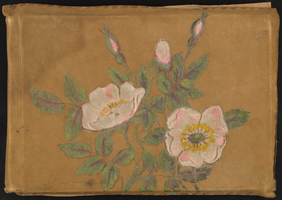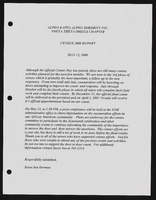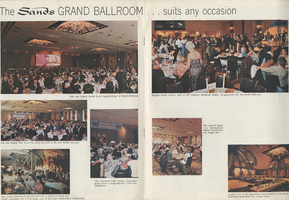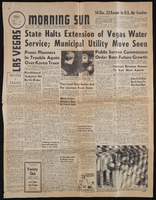Search the Special Collections and Archives Portal
Search Results

Las Vegas Sentinel Voice, October 20, 1983
Date
Description
Full edition of the October 20, 1983 issue of the Las Vegas Sentinel-Voice.
Text

Scrapbook of poetry and other clippings
Date
Archival Collection
Description
Scrapbook of poetry and other clippings
Mixed Content

Jessica Guiao oral history interview: transcript
Date
Archival Collection
Description
Oral history interview with Jessica Guiao conducted by Grecia Lopez on November 22, 2022 for the Reflections: the Las Vegas Asian American and Pacific Islander Oral History Project. In this interview, Guiao recalls her childhood in Hayward, California, and being raised in Las Vegas, Nevada. She recalls not liking the climate of Nevada at first, and describes the friends she has made throughout her time in the city and the identity she has developed. Guiao discusses some of the pressures and stereotypes surrounding Asian Americans, such as what career path they should pursue or the aversion to embracing subcultures, and how she has consolidated her rebellion into her own identity. Throughout the interview, Guiao touches on other topics such as Filipino food, the long-standing history between Mexican and Filipino communities, Catholicism, goth culture, and anti-Asian hate and racism that she and her family has faced.
Text
Southern Nevada Jewish Heritage Project
"The goal of this 2014-2015 project is to build a web and mobile resource that will connect researchers from around the world to thousands of historical items—photographs, brochures, scrapbooks, letters, drawings, videos, and more—detailing the lives and contributions of Jews in Southern Nevada. It will include carefully researched biographies, timelines, and histories of institutions, events, and prominent themes showing the integral roles Jews have played in the history of Southern Nevada.
Corporate Body
Margot Mink Colbert Papers
Identifier
Abstract
The Margot Mink Colbert Papers (approximately 1959-2018) are comprised of materials that represent Colbert's career as a professional dancer, choreographer, and instructor. The materials span Colbert's career as a dancer in New York City at The Juilliard School, instructor at the University of Wisconsin-Madison, and instructor at the University of Nevada, Las Vegas. The materials in this collection also document Colbert's teaching career as well as her professional studio Ballet Mink. The materials include press and promotional materials about performances choreographed by Colbert within the United States as well as other countries including Russia and Denmark. The collection also include recordings of Colbert's choreographed performances.
Archival Collection

Alpha Kappa Alpha Sorority, Theta Theta Omega Chapter connection committee and Census 2000 reports
Date
Archival Collection
Description
From the Alpha Kappa Alpha Sorority, Incorporated, Theta Theta Omega Chapter Records (MS-01014) -- Chapter records file.
Text

14th Anniversary Issue of the Sands Times from the Sands Hotel and Casino, December 1966
Date
Archival Collection
Description
The 14th anniversary issue of the Sands Times magazine from the Sands Hotel and Casino in Las Vegas, Nevada. Articles written in the magazine describe various events held at the Sands, entertainment news, and celebrity appearances.
Mixed Content


